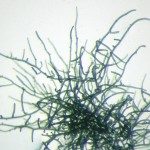Lien vers Pubmed [PMID] – 32774329
Lien DOI – 10.3389/fmicb.2020.01527
Front Microbiol 2020 ; 11(): 1527
Baeocytous cyanobacteria (Pleurocapsales/Subsection II) can thrive in a wide range of habitats on Earth but, compared to other cyanobacterial lineages, they remain poorly studied at genomic level. In this study, we sequenced the first genome from a member of the Hyella genus – H. patelloides LEGE 07179, a recently described species isolated from the Portuguese foreshore. This genome is the largest of the thirteen baeocyte-forming cyanobacterial genomes sequenced so far, and diverges from the most closely related strains. Comparative analysis revealed strain-specific genes and horizontal gene transfer events between H. patelloides and its closest relatives. Moreover, H. patelloides genome is distinctive by the number and diversity of natural product biosynthetic gene clusters (BGCs). The majority of these clusters are strain-specific BGCs with a high probability of synthesizing novel natural products. One BGC was identified as being putatively involved in the production of terminal olefin. Our results showed that, H. patelloides produces hydrocarbon with C15 chain length, and synthesizes C14, C16, and C18 fatty acids exceeding 4% of the dry cell weight. Overall, our data contributed to increase the information on baeocytous cyanobacteria, and shed light on H. patelloides evolution, phylogeny and natural product biosynthetic potential.

